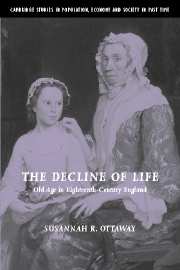Crossref Citations
This Book has been
cited by the following publications. This list is generated based on data provided by Crossref.
Athey, Stephanie
2004.
Recent Publications.
Women's Studies,
Vol. 33,
Issue. 5,
p.
695.
Levine-Clark, Marjorie
2006.
The Gendered Economy of Family Liability: Intergenerational Relationships and Poor Law Relief in England's Black Country, 1871–1911.
Journal of British Studies,
Vol. 45,
Issue. 1,
p.
72.
Hale, Matthew
Hawkins, Richard
and
Wright, Catherine
2006.
List of publications on the economic and social history of Great Britain and Ireland published in 2005.
The Economic History Review,
Vol. 59,
Issue. 4,
p.
788.
Fideler, Paul A.
2006.
Social Welfare in Pre-Industrial England.
p.
142.
Looser, Devoney
2007.
A Companion to the Eighteenth-Century English Novel and Culture.
p.
299.
Bourdieu, Jérôme
and
Kesztenbaum, Lionel
2007.
Comment vivre vieux dans un monde vieillissant ?.
Population,
Vol. Vol. 62,
Issue. 2,
p.
221.
Hernández Franco, Juan
2009.
Pasado y presente de Floridablanca como objeto de la Historia.
Mélanges de la Casa de Velázquez,
p.
163.
Wall, Richard
2010.
Bequests to widows and their property in early modern England.
The History of the Family,
Vol. 15,
Issue. 3,
p.
222.
Walther, Gerrit
Scattola, Merio
Pfisterer, Ulrich
Satzinger, Georg
Wiedner, Saskia
Meine, Sabine
Externbrink, Sven
Reith, Reinhold
Stöger, Georg
Carl, Horst
Stollberg-Rilinger, Barbara
Hufeld, Ulrich
Appuhn-Radtke, Sibylle
Weber, Wolfgang E. J.
von Friedeburg, Robert
König, Hans-Joachim
Rode-Breymann, Susanne
Meumann, Markus
Rinke, Stefan
Hengerer, Mark
Keller, Katrin
Babel, Rainer
Gersmann, Gudrun
Schmale, Wolfgang
Reichardt, Rolf
Langewiesche, Dieter
Lieb, Stefanie
Koller, Edith
Lüsebrink, Hans-Jürgen
Siegert, Christine
Gierl, Martin
Schlinker, Steffen
Gareis, Iris
Mautner, Hendrikje
Mittag, Achim
Otto, Martin
Haferkamp, Hans-Peter
Gabriel, Martin
Schirren, Thomas
Synofzik, Thomas
Gadebusch-Bondio, Mariacarla
Behringer, Wolfgang
Tischer, Matthias
Czeguhn, Ignacio
Müßig, Ulrike
Poppinga, Onno
von Mallinckrodt, Rebekka
Altgeld, Wolfgang
Wrede, Martin
Töpfer, Thomas
Flügel, Axel
Wolf, Klaus
König, Hans-Joachim
Layh, Susanna
Kanz, Roland
Butzer, Günter
Günter, Manuela
Kroppenberg, Inge
Mahoney, Dennis F.
Büttner, Frank
Eichhorn, Andreas
Meinel, Christoph
Walter, Peter
Geffarth, Renko
Eckert, Georg
Schneider, Konrad
Ehmer, Josef
Beck, Michael
Weber, Alexander
Schweizer, Stefan
Henkel, Jürgen
Wasmuth, Jennifer
Veluwenkamp, Jan Willem
Nolte, Hans-Heinrich
Marasinova, Elena
Bahro, Steffi
Bingener, Andreas
Bremer, Thomas
Troßbach, Werner
Friedrich, Wolfgang
Lück, Heiner
Burschel, Peter
Seidenspinner, Wolfgang
Sparn, Walter
Nüssel, Friederike
Graf, Friedrich Wilhelm
Piasecki, Peter
Zimmermann, Margarete
Körner, Hans
Fessner, Michael
Lafuente, Gloria Sanz
Denzel, Markus A.
Priesner, Claus
Griesebner, Andrea
Costa, Rosa
Schöller, Rainer
te Heesen, Anke
Mathias, Regine
Grotjahn, Rebecca
Deupmann, Christoph
Jordan, Stefan
Bremer, Kai
Moßburger, Hubert
Vögele, Jörg
Erben, Dietrich
Müller-Wille, Staffan
Schiemann, Gottfried
Tschopp, Silvia Serena
Saurer, Edith
Wilbertz, Gisela
Reichmuth, Stefan
Dillinger, Johannes
Sing, Thomas
Marx, Peter W.
Schmidt, Beate Agnes
North, Michael
Dobler, Silvia Carola
Malinowski, Bernadette
Löhnig, Martin
Brunner, Rainer
Kampmann, Christoph
Dougherty, Carolyn
Bartels, Christoph
Popplow, Marcus
Ellmers, Detlev
Schinkel, Eckhard
Bayer, Axel
Kinzler, Sonja
Voltmer, Rita
Laß, Heiko
Eckart, Wolfgang Uwe
Gorißen, Stefan
Siebenhüner, Kim
Rössner, Philipp Robinson
Häberlein, Mark
Meiners, Uwe
Goehrke, Carsten
Chapuis-Després, Stéphanie
Laube, Martin
Köster, Roman
Troitzsch, Ulrich
Haarmann, Harald
Bley, Helmut
Schmidt-Glintzer, Helwig
Frese, Heiko
Zimmermann, Clemens
Hiller, Marion
Leppin, Volker
Kim, Nanny
Niefanger, Dirk
Bruning, Jens
Lohmann, Ingrid
Rutz, Andreas
Blum, Paul Richard
Weikl, Katharina
Brinkschulte, Eva
Röcke, Werner
Vogel, Lothar
Schmidt, Peer
Weitensfelder, Hubert
Regnath, R. Johanna
Maissen, Thomas
Steinle, Friedrich
Wagner, Michael
Müller, Christoph
Brauneder, Wilhelm
Beck, Thomas
Hattendorf, John
Holzhey, Helmut
Zander, Helmut
Möller, Christian
Schneider, Johann
Pelzer-Reith, Birgit
Holbach, Rudolf
Sarx, Tobias
Kästner, Alexander
Strohmeyer, Arno
Collin, Peter
Siebe, Daniela
Asche, Matthias
Hamou, Philippe
Lehmann-Brauns, Sicco
Aust, Cornelia
Karsten, Arne
Kraft, Ekkehard
Bork, Camilla
Jarzebowski, Claudia
Antoni, Klaus
Mathieu, Christian
Freitag, Florian
Dix, Andreas
Rüther, Kirsten
Stange, Marion
Wendt, Reinhard
Lucassen, Jan
Lucassen, Leo
Beyrer, Klaus
and
Gludovatz, Karin
2010.
Enzyklopädie der Neuzeit.
p.
1.
King, Steven A.
2010.
Forme et fonction de la parenté chez les populations pauvres d’Angleterre, 1800-1840.
Annales. Histoire, Sciences Sociales,
Vol. 65,
Issue. 5,
p.
1147.
Carvallo, Sarah
2010.
Ageing in the Seventeenth and Eighteenth Centuries.
Science in Context,
Vol. 23,
Issue. 3,
p.
267.
2011.
Poor Relief in England, 1350–1600.
p.
299.
King, Steven
2011.
Accommodating Poverty.
p.
145.
Bourdieu, Jérôme
Kesztenbaum, Lionel
and
Postel-Vinay, Gilles
2011.
Thrifty Pensioners: Pensions and Savings in France at the Turn of the Twentieth Century.
The Journal of Economic History,
Vol. 71,
Issue. 2,
p.
383.
Boulton, Jeremy
and
Schwarz, Leonard
2011.
Accommodating Poverty.
p.
221.
Jaeger, Friedrich
2012.
Enzyklopädie der Neuzeit.
p.
1.
Yallop, Helen
2013.
Representing Aged Masculinity in Eighteenth-Century England.
Cultural and Social History,
Vol. 10,
Issue. 2,
p.
191.
Gapert, René
Black, Sue
and
Last, Jason
2013.
Test of age-related variation in the craniometry of the adult human foramen magnum region: implications for sex determination methods.
Forensic Science, Medicine, and Pathology,
Vol. 9,
Issue. 4,
p.
478.
Vickery, Amanda
2013.
Mutton Dressed as Lamb? Fashioning Age in Georgian England.
Journal of British Studies,
Vol. 52,
Issue. 4,
p.
858.
McIntosh, Marjorie K.
2014.
Poor relief inElizabethanEnglish communities: an analysis ofCollectors' accounts.
The Economic History Review,
Vol. 67,
Issue. 2,
p.
331.



